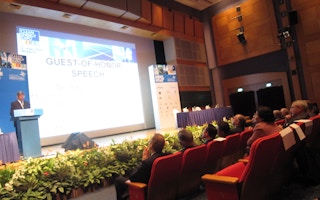Asia must embrace clean energy for the sake of its own security, said an Asian Development Bank official on Tuesday.
Speaking at the opening ceremony of the Clean Energy Expo Asia 2010, ADB’s WooChong Um told the audience that the growth of Asian economies has led to an equally large increase in energy demand which is being met through the use of fossil fuels.
This, in turn, has increased the dependence of the region on oil – the market for which has historically been shown to be unstable, especially as global reserves of fossil fuels dwindle. More dangerously, high oil prices have been shown to significantly impact economic growth.
“Clearly, over-reliance on fossil fuels places Asia in a very precarious situation with regards to energy security,” said Mr Um, who is deputy director of the ADB’s Regional and Sustainable Development Department.
Asia’s demand for fossil fuels have also made it a major contributor to climate change. The region’s current carbon dioxide emissions make up 30 percent of global carbon dioxide (Co2) emissions. This means that even if the developed world achieves an 80 percent cut in greenhouse gas emissions by 2050, the atmospheric concentration of greenhouse gases will not reduce or even stabilize unless the Asian economies make a concerted effort to reduce their own emissions, said Mr Um.
“Even if the increased energy use creates economic growth at a pace that has never before been seen in history, it cannot counterbalance the negative impact climate change will have and already has in several areas.”
Singapore’s Minister for the Environment and Water Resources Yaacob Ibrahim, who was guest of honour at the opening ceremony, had earlier made the same point in his opening address. “We have to balance our thirst for energy with the need to avert serious impacts on the global climate,” he said, noting that this year has already seen a slew of erratic weather events globally.
The economic impact of climate change is another issue which Asia must address. According to a recent study by the ADB, the economy-wide cost of climate change for Asian countries, particularly Indonesia, the Philippines, Thailand and Vietnam, could reach over 6.7 percent of gross domestic (GDP) per year by 2100.
The solution is for Asia to improve its energy efficiency and develop indigenous sources of energy, so as to lessen its dependence on imported oil and to reduce its carbon footprint.
This is a trend already being played out worldwide. The UN Advisory Group on Energy and Climate Change has called for a 40 percent reduction in global energy intensity by 2030, and emerging economies, particularly those in Asia are taking the lead in answering the call. China, for instance, has targeted a 20 percent reduction in energy intensity by 2010.
As a result of the emphasis countries are placing on clean energy, the market for low carbon and energy efficient technologies is growing very quickly.
This year alone, clean energy investments in Asia are predicted to reach US$70 billion, led by China and India. An HSBC report released in September also estimates that the global market for products related to clean energy is expected to triple by 2020, reaching about US$2.2 trillion.
There is a further strategic reason for emerging economies to invest in low-carbon technology, said Mr Um: it will allow them to bypass the energy-intensive phase which the industrialized economies went through over the course of the previous century.
“If you’re not doing something on clean energy or climate change, whether you are a government or a private sector company, you’re being left behind in this competitive environment,” he said.
Eco-Business.com’s coverage of the Clean Energy Expo Asia 2010 is brought to you by Conchubar Capital Management.
Click here to read all stories from the Clean Energy Expo Asia 2010.

















